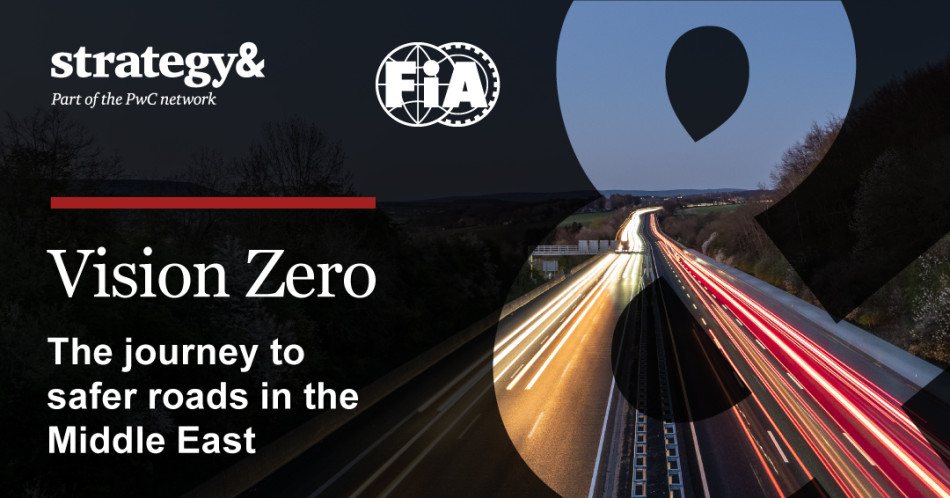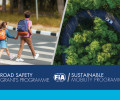GCC countries could significantly reduce annual road traffic fatalities and boost economic growth by adopting comprehensive road safety strategies – latest report by Strategy& and FIA


Countries across the GCC could save thousands of lives annually, and boost economic growth, if they succeed in attaining key global road safety performance targets, according to the latest report by Strategy& Middle East, part of the PwC network, and the Fédération Internationale de l’Automobile (FIA), titled “Vision Zero: The journey to safer roads in the Middle East.”
The analysis highlights the potential social and economic benefits if the GCC countries achieve just one of the 12 road safety targets laid out in the UN General Assembly’s Decade of Action for Road Safety resolution. By achieving Target 4 - ensuring 75% of travel is on roads that meet recommended technical standards that take into account safety for all road users – GCC countries could save 2,800 lives per year (equivalent to around a 22% reduction), and boost economic growth by around $250 billion over the course of 20 years, thus making significant progress in achieving “Vision Zero,” which aims for no deaths or serious injuries on the roads.[1]
President of the FIA, Mohammed Ben Sulayem commented saying, “Safety treatments are essential for the development of the GCC countries. The impact of crashes on families, communities, livelihoods, and national economies is significant. However, through the implementation of readily available technologies and a concerted effort across policy and infrastructure development, GCC countries can make a real difference in saving lives. This report will create a framework for our Member Clubs in the region to support governments in their journey towards a safer mobility.”
“GCC countries are already making significant progress in improving road safety, but incidents and fatalities in the region remain higher than in many other parts of the world,” said Hicham Fadel, Partner with Strategy& Middle East. “By shifting the majority of GCC road travel to safer roads, pressure on healthcare systems can be alleviated, and economic productivity can be safeguarded against the economic cost of injuries and fatalities,” he added.
“Efforts to meet ambitious targets aimed at reducing fatalities and serious traffic injuries are already underway around the region. To get there, the FIA and Strategy& have developed a comprehensive roadmap encompassing five key pillars for policymakers, planners and stakeholders to improve road safety and save lives,” said Gustave Cordahi, Principal with Strategy& Middle East.
The path for GCC countries to improve their traffic safety record is a comprehensive road safety strategy that is informed by data and enabled by technology. It requires action in five areas:
- Improved infrastructure. Integrating safety standards into the design and operation of an individual road or network can reduce deaths and serious injuries. Designers, urban planners, and construction companies can improve designs before roads are constructed or upgraded – and leverage new technologies such as “smart” speed bumps that automatically alter their shape, size, or rigidity based on the speed of the car passing over them. AI technologies can also help authorities to monitor roads for damage as well as predict and prioritise maintenance efforts. Saudi Arabia, for example, is already piloting such AI-enabled solutions through multiple use cases.
- Smart vehicles. Retrofitting existing vehicles with new technologies, more frequent vehicle inspections, and in-vehicle technologies that offer greater passenger protection, all form part of a movement towards the development of smarter vehicles. International standards are already available – such as car safety rating systems – and emerging vehicle-based technologies, such as connectivity, automotive telematics, and automation, can improve safety.
- Empowered commuters. Real-time information about road conditions and traffic flows can ensure continued hazard awareness and help drivers make better decisions. Dynamic message signs, speed indicator displays, or alerts and warnings through in-vehicle units and personal devices can all contribute to more empowered commuters. Similarly, changes to pedestrian crossings and designated bike lanes can protect those travelling on foot and by bicycle.
- Efficient operations. Technologies such as smart traffic lights and signal lengths based on real-time data can support smarter traffic and incident management. Similarly, dynamic speed regulation can change speed limits according to real-time traffic, road, or weather conditions so that vehicles drive at the most efficient speed. Similarly, new technological tools can reduce incident detection time, including AI-enabled incident prediction and detection.
- Robust enforcement. Advanced traffic safety programmes are already in place in several MENA countries – with Saudi Arabia’s programme deploying edge computing for traffic law enforcement. New technologies can now capture the most serious offences automatically, such as a failure to wear seatbelts, using mobile phones while driving, speeding, running red lights, and illegal lane-switching and U-turns. To catch offenders, road systems must utilise radar monitoring, drones, smart patrol vehicles, and hand-held and vehicle-fitted cameras to detect violations. AI-enabled CCTV cameras, which can run computer vision algorithms to detect many different types of violations, are becoming more cost-efficient.
Significant progress has already been made in several GCC countries and comprehensive traffic safety plans have been developed. Saudi Arabia, for example, recorded a 6.8% decrease in road traffic incidents in 2022 compared with 2021, as well as a 2.1% drop in road fatalities over the same period.[2] In the UAE, Dubai set out 53 strategic initiatives within four key categories: traffic control, vehicle and highway engineering, traffic awareness, and systems and management. This new report gives the keys to further advancing that work.
A road safety strategy that deploys the above-mentioned leading practices, improved management techniques, and new technologies can offer GCC countries substantial economic benefits. It can save lives, optimise road systems, and boost the economy, playing a pivotal role in shaping a secure transportation network.
The full report can be read below:
[1] Estimate based on GCC countries attaining Target 4 of the 12 global road safety performance targets; analysis leverages International Road Assessment Programme (iRAP) Framework (https://tinyurl.com/vzkaw5bm)
[2] Source: Saudi Gazette, “Major Accidents in Saudi Arabia Decreased to 6.8% in 2022; Deaths Too by 2.1%,” January 29, 2023 (https://tinyurl.com/mr29tbah)

 Facebook
Facebook Twitter
Twitter






